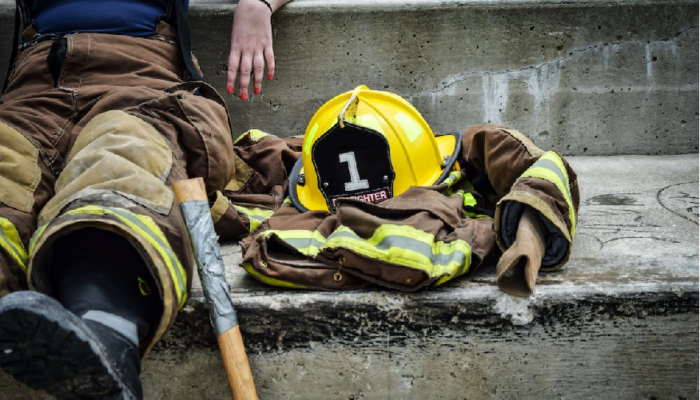
You might have heard that firefighting is more than just a job. Indeed, it’s true. Becoming a firefighter is a calling that enables you to step into the line of fire, ready to protect lives and property.
However, in the midst of battling flames and saving lives, it’s easy to overlook your own health. Physically demanding work, exposure to hazardous materials, and the constant stress of emergency situations can lead to serious health challenges.
According to the U.S. Fire Administration, there are around 1,212,700 individuals who work in fire departments. This includes full-time, volunteer, and on-call firefighters, as well as other staff who work there but aren’t involved in firefighting. It’s a noble profession, but it can adversely affect your health.
That’s why we’ve put together this guide to help you prioritize your well-being. In this blog, we will discuss the tools you need to lead a healthier life.
Steer Clear of Harmful Extinguishers
When you’re in the heat of a firefight, every second counts. It’s instinctive to grab the closest firefighting foam and douse those flames, but not all extinguishers are created equal. One type that’s raised concerns in recent years is Aqueous Film-Forming Foam (AFFF). While it may seem effective in quelling fires, there are hidden dangers lurking within.
According to TorHoerman Law, AFFF contains PFAS chemicals which are known to be toxic to the human body. They remain in the environment and human body indefinitely. This leads to severe health conditions like different forms of cancer.
In fact, numerous firefighters have suffered adverse health effects as a result of using AFFF. These conditions have led to emotional trauma, income loss, physical injuries, mental health problems, and more. Consequently, they have filed an AFFF lawsuit to seek compensation and hold the manufacturers accountable.
Prioritize Physical Fitness
As a firefighter, physical fitness is essential, but your profession makes it challenging to maintain peak physical condition. Being a firefighter, you are susceptible to various types of injuries, as revealed by a recent study.
The study found that injuries occurring at the fire station (37.9%), during physical training (26.6%), during fire emergencies (14.7%), and non-fire emergencies (12.1%) were the most frequent ones.
To minimize the occurrence of injuries, it is recommended that firefighters stay physically active during their leisure time or when they are off-duty. Many fire departments schedule prescribed exercise programs when firefighters are on duty.
Here are three practical fitness strategies tailored to firefighters:
- Strength and core training: Focus on functional strength exercises that simulate the movements and demands of firefighting. Exercises like squats, deadlifts, and planks can enhance your core stability and overall strength. This, in turn, makes tasks like carrying heavy equipment and victims more manageable.
- Flexibility and mobility: Don’t underestimate the importance of flexibility and mobility. Mobility exercises can stop you from getting hurt and make it easier for you to move in tricky places during emergencies.
- Rest and recovery: Firefighters really need to get a lot of rest and let their bodies heal. Make sure you get enough sleep and let your body heal after tough workouts and long shifts. Proper hydration and nutrition also play a crucial role in maintaining peak performance and health.
Focus On Eating Right
In the challenging world of firefighting, staying healthy is more than just about physical fitness. Today, being healthy means what you put into your body. Despite occupational hazards, US firefighters have been more susceptible to sudden cardiac death, accounting for nearly 44% of deaths between 1977 and 2021. The shocking finding means firefighters need diets that can reduce the risks of CVDs.
Among different dietary patterns, the Mediterranean diet stands out with the strongest evidence for benefits on cardiovascular health. It’s a diet rich in fruits, vegetables, and lean proteins.
In a study published in JAMA Network, most US firefighters said they liked the Mediterranean diet the most. Moreover, 75% of them wanted to find out more about eating healthily. The numbers show that more firefighters are realizing how important good nutrition is for their overall health. To protect your heart and overall well-being, consider adopting a Mediterranean-inspired eating plan.
Strategies to Enhance Mental Health
In the realm of firefighting, staying healthy isn’t solely about physical strength and resilience, as it also hinges on maintaining robust mental health.
A recent study found that over half of firefighters could be at risk of experiencing PTSD, depression, anxiety, or problems with alcohol. This statistic underscores the pressing need for strategies that prioritize and enhance mental well-being within the firefighting community.
To safeguard your mental health and build resilience, consider the following strategies:
- Seek professional support: Due to your demanding profession, it’s important to regularly consult with mental health professionals. They are experts in managing the specific stressors and traumas that firefighters face.
- Peer support networks: Build and maintain strong bonds with your fellow firefighters. Sharing experiences and providing support to one another can be a powerful way to cope with stress and traumatic events.
- Stress management techniques: Try out stress-reduction techniques like mindfulness and deep breathing. These techniques can assist you to remain relaxed and focused when you’re facing highly stressful situations.
By implementing these strategies, you can proactively address the mental health challenges that come with firefighting.
In Conclusion
In the world of firefighting, health is a lifeline from physical fitness to nutrition, mental well-being, and beyond. Every aspect of your health matters.
Your well-being directly impacts your ability to serve and protect. So, make self-care a priority, both on and off duty. Prioritize fitness, choose nutritious foods, nurture your mental health, and support your fellow firefighters in their wellness journeys.
By embracing these principles, you’re not only safeguarding yourself but also ensuring you can continue to be the hero your community relies on.
